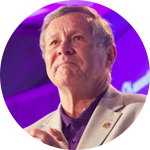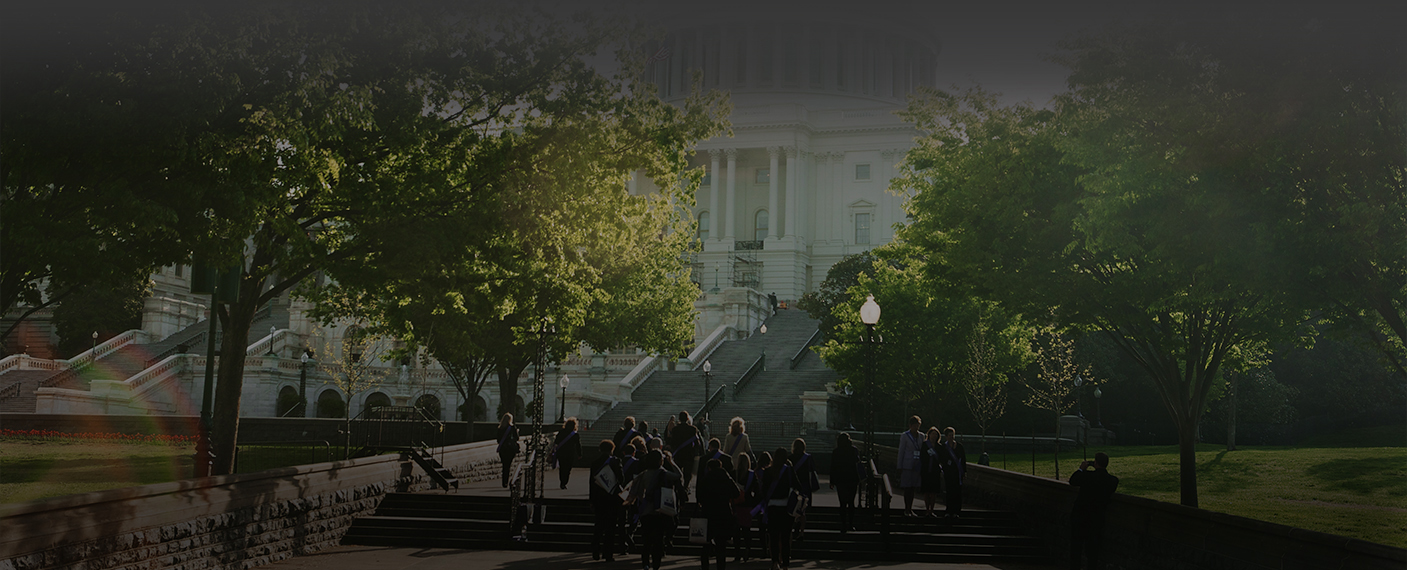Scott Russell
Scott Russell was diagnosed with younger-onset Alzheimer's disease in 2009 at what he calls "age 59 1/2." He is a member of the Alzheimer's Association National Board of Directors, serves as an Alzheimer's Association Ambassador and was chair of the 2014 Advocacy Forum, the first person with Alzheimer's to hold that position.
What has life been like for you since your diagnosis?
Initially, I went through a couple of months of depression. I wasn't sure how to handle it, even though my father had died of Alzheimer's. I saw that side of it as a caregiver for him for a short amount of time. But then I got involved with the Alzheimer's Association. That's what sparked me to get moving. I felt like I could make a difference through advocacy and fundraising.
How soon after your diagnosis did you become involved?
Pretty soon, because my wife got in touch with the Alzheimer's Association. I got involved within probably a couple of weeks, and that pulled me out of my pity party.
As someone who was a caregiver for a person with Alzheimer's and now has it, that gives you an interesting perspective on the disease.
Well, I knew what my father went through, and it was very hard to think that I may be going through that. On the positive side, I really feel that this is an important mission for me, and it also taught me to live life for now, to really make an effort at it. Time is limited — we all know that.
Was your perspective different on life before you had Alzheimer's?
Oh, yes. Absolutely. You don't take the time — I think that's true of most people — to smell the roses, to appreciate what you have and what you can do. You get wrapped up in the minutiae in your life and you fail to see the bigger things, like spending time with your family. Every morning now, I wake up and I appreciate the day. It could be pouring rain outside or be too cold or too hot; other people might say, "Oh, that's horrible," but I look at it much differently.
How are you doing now, mentally and physically?
Pretty well, actually. I've always played sports and exercised, but now I enjoy it so much more. I go hiking, and I enjoy that tremendously. I'm a big believer in mental exercise, so I spend a lot of time exercising my brain, more than I ever did before. Instead of sitting in front of the TV, I'll try to do puzzles. I'll read, and I'll regurgitate what I read to my wife. She gets kind of sick of that once in a while.
How has your Alzheimer's impacted your work and family life?
When I was diagnosed, I really couldn't work anymore. I didn't tell my employer about it until one time my boss asked me, "Are you OK?" I was missing things in meetings, and he said I was acting differently. At that point, I went ahead and told him about the diagnosis. If anything, it has strengthened my marriage and family life. I spend more time with my sons. We talk a lot more.
You have a very positive spin on having the disease. I don't know how common that is.
I don't know if it's common, either, but I'm a real believer that you have to have a positive attitude. Too many people don't. It's important to have a successful life while you can. That's what I try to do.
There's something about people who have resilience. It's the way you approach any kind of problem. A positive attitude is critical. So is social interaction. It's so easy with this disease to crawl into a corner and not communicate. I find it sometimes hard to communicate now, but I don't shy away from it. It's my obligation to reach out to other people and engage them. If they know that you've been diagnosed with Alzheimer's, they don't know how to deal with you or communicate with you, so they pull away. I also try to do it with humor. It helps people feel like they can let down their guard and talk to you and ask you about death or losing your mind.
You're on the Association's national board and serve as an Ambassador, and you were an Early-Stage Advisor. That's a large commitment. How do you get other people to become engaged with the cause like you are?
Part of it is, again, a positive attitude. It's done a lot for me. I feel like I've got a purpose and a mission, and I feel like I can make a difference. So what I do is tell my story. I talk about getting involved and becoming engaged. Service to other people not only helps people but also helps you, too. It helps how you feel about yourself and about life. This makes me feel good. It energizes me.
How active are you as an Ambassador?
I'm so active that my congressman (Rep. Jim Himes, D-Conn.) knows me by name. The last time I was down in Washington, a group of us went to his office to advocate for Alzheimer's. He introduced himself to everyone and asked their names, and he got to me and said, "I know you, Scott." Initially, he didn't know a lot about Alzheimer's, but he was open to being educated, and he's now very supportive of the cause.
How many Forums have you attended?
Every one since I was diagnosed.
You were the first person with Alzheimer's to serve as Forum chair. Is that an important distinction for you?
I was honored to be asked to do that. I was looking forward to it, but I was also apprehensive because there was a fair amount of speaking that I was asked to do. But it was great. I felt honored to do it.
Was there anything about the 2014 Forum that stood out to you?
I saw a distinct difference in the number of young people that were there versus when I first attended. There were many more. It's very important to get our youth involved in a much bigger way.
Putting the advocacy part aside, even though it's the reason people are there, we hear from Forum attendees about how great it is to reconnect with people from year to year and to talk about their experience.
That's a really good point. Usually, the people that go to the Forum have a connection to the disease, and this is another way of having some support.
Do you think Alzheimer's advocacy would be as far along as it is without the Forum?
No. Absolutely not. The Forum gives us a national character. It's very important that people understand this is a nationwide battle. Actually, it's a worldwide battle.
What would you say to someone who was considering attending the Forum but maybe wasn't sure?
I would explain to them that going to the Forum is not only educational, it really can energize you. People there get really pumped up. Secondly, Washington, D.C., is a great place to visit. Thirdly, some of the speakers that we have are incredibly interesting. The Forum gives you all of those things. It gives you a sense that you're doing something and that you're involved in something that people will look back in history and say, "That was a defining moment."
Back to top
Back to Advocacy Stories


Join the conversation #ENDALZ #alzforum